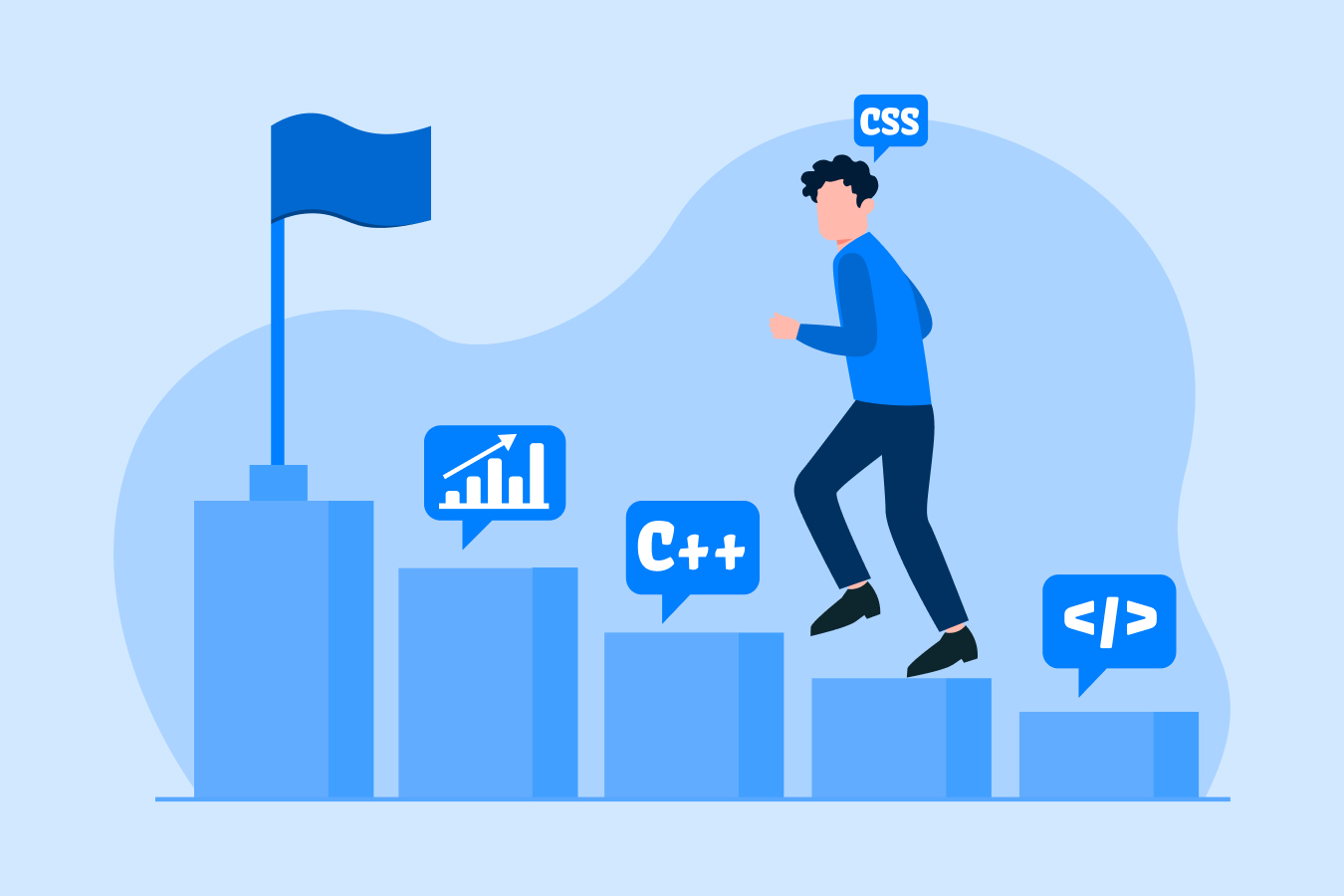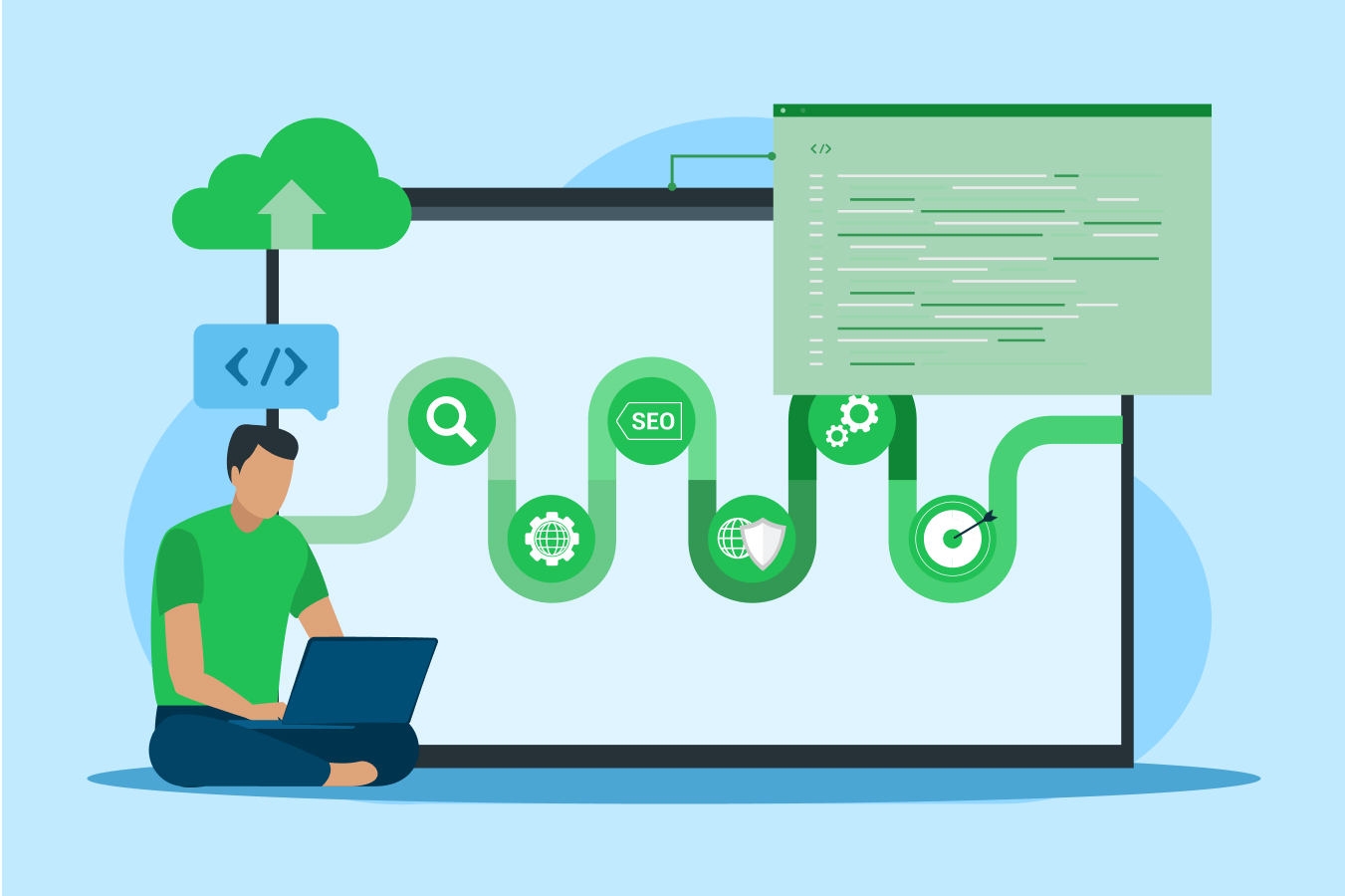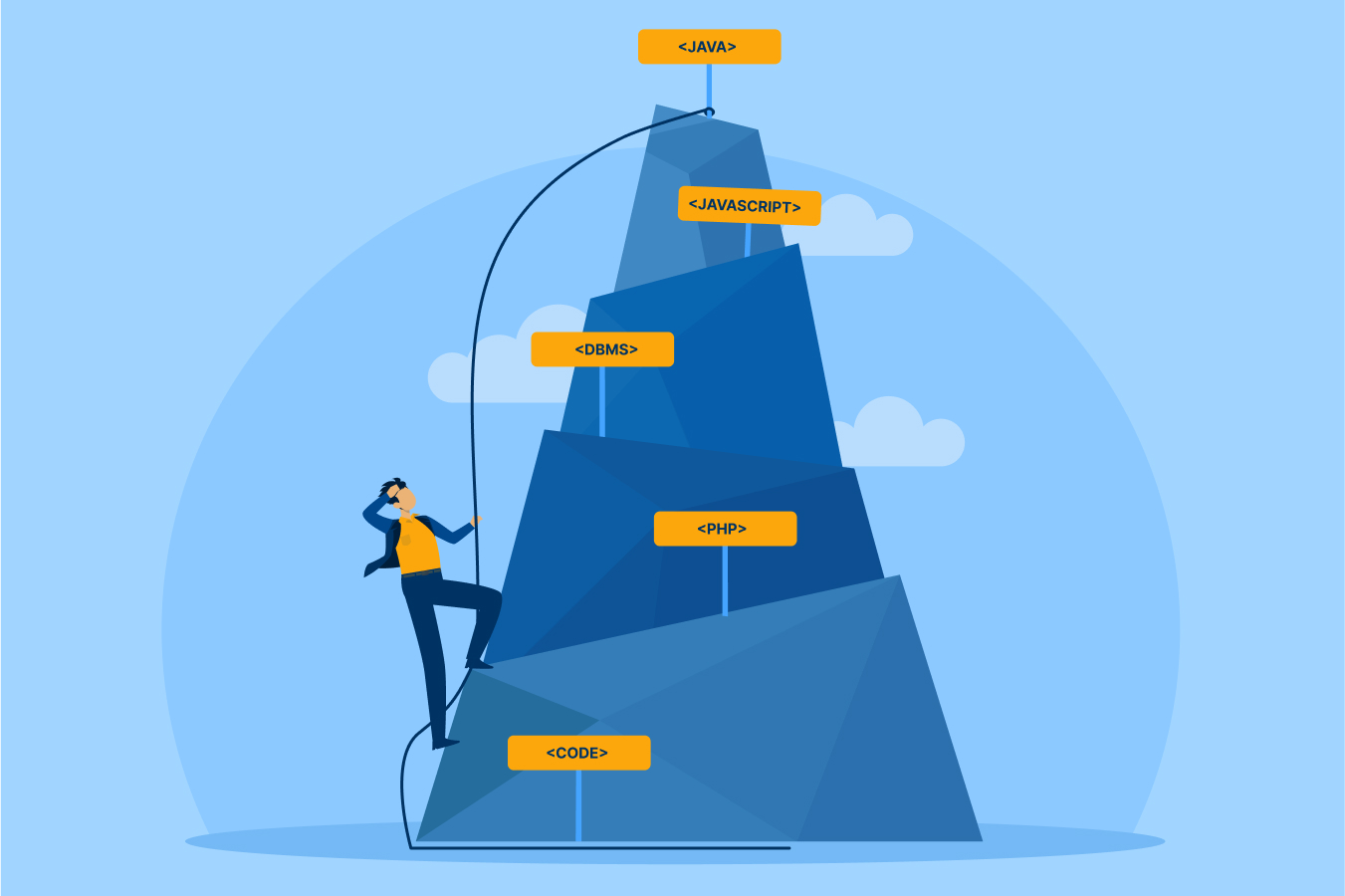Is Web Development a Good Career?
In this era of digital innovation, web development is a compelling career choice for individuals with a passion for coding and creativity. In this blog, we explore the answer to the question: is web development a good career? By assessing its growth prospects, diverse career prospects, and dynamic technological landscape, we offer valuable insights for those considering a career in web development. Moreover, this comprehensive guide will assist you in making an informed decision and navigating the exciting possibilities this field presents.
What is Web Development?
Web development involves creating, building, and maintaining websites and web applications. It encompasses a range of tasks from designing the layout and functionality of a site to ensuring its responsiveness and performance across various devices. Web developers work closely with clients, designers, and other stakeholders to bring their vision to life and deliver high-quality, user-friendly websites.
Key Responsibilities of a Web Developer
The key responsibilities of a web developer include:
- Designing website layouts and user interfaces that are visually appealing and user-friendly.
- Collaborating with designers and other team members to ensure the website meets the client’s requirements and brand guidelines.
- Testing website functionality and performance to identify and fix any issues or bugs.
- Implementing security measures to protect the website and its users from potential threats like hacking or data breaches.
- Ensuring websites are optimized for speed and usability to provide a smooth and efficient user experience.
- Deploying and maintaining websites on servers, ensuring smooth operation and timely updates.
Skills Required to Excel as a Web Developer
To build a flourishing career in the web development domain, individuals must possess the following technical and soft skills:
Technical Skills:
- Proficiency in HTML, CSS, and JavaScript is essential for web developers to create the structure, styling, and interactivity of web pages.
- Knowledge of web development frameworks like React or Angular helps developers build complex and scalable applications efficiently.
- Understanding responsive design principles enables developers to create websites that adapt seamlessly to different screen sizes and devices.
- The ability to work with databases and server-side languages is crucial for developing dynamic websites and web applications that store and retrieve data.
- Familiarity with version control systems like Git helps developers manage code changes, collaborate with team members, and maintain a codebase history.
Soft Skills:
- Strong business communication skills are essential for web developers to collaborate effectively with designers, project managers, and clients.
- Problem-solving abilities are crucial for debugging issues, finding creative solutions, and continuously improving the codebase.
- Time management skills help web developers prioritize tasks, accurately estimate project timelines, and deliver projects on time.
- Analytical thinking enables web developers to break down complex problems, identify areas for improvement, and make data-driven decisions.
Scope of Web Development in 2024
According to the Bureau of Labor Statistics, employment for web developers is projected to grow by 16% between 2022-2032. This is significantly faster than the average across all occupations, resulting in approximately 34,700 new web developer jobs every year and making web development a good career choice for you.
Flourishing Job Roles in Web Development
With digital advancement and increasing reliance on the internet, the scope of career prospects in web development has evolved. The following are some popular job roles in web development:
1. UI/UX Designers
UI (User Interface) designers focus on the visual aspects of a product’s interface. They create the layout, and design elements, and interactive features to ensure that users have an aesthetically pleasing and intuitive experience. Their work involves selecting colors, fonts, and images, to create a cohesive design that aligns with the brand’s identity.
UX (User Experience) designers concentrate on the overall feel and usability of the product. They conduct user research, develop personas, and create user journey maps to understand and improve how users interact with the product. Their goal is to enhance user satisfaction by making the product more accessible, efficient, and enjoyable to use.
2. Cloud Engineer
Cloud engineers are responsible for designing, planning, managing, and maintaining cloud computing systems. Their duties include migrating existing systems to the cloud, ensuring data security, managing cloud infrastructure, and optimizing performance and costs. Cloud engineers often collaborate with software developers to integrate cloud services with applications.
3. DevOps Engineer
DevOps engineers bridge the gap between software development and IT operations. They focus on automating and streamlining the software development process, enabling continuous integration and continuous delivery (CI/CD). Their goal is to enhance the efficiency, reliability, and speed of software deployment.
4. Cybersecurity
Cybersecurity professionals protect an organization’s computer systems, networks, and data from security breaches, cyber-attacks, and other threats. They develop and implement security measures, conduct risk assessments, and monitor systems for vulnerabilities.
Average Compensation Offered
The average annual pay for web developers is ₹6.7 LPA. This can vary depending on your skill set, location, and level of experience. Here’s a general overview of the offered compensation for web developers.
- Entry-level Web Developers: These individuals can earn an average income of ₹5.8 LPA, with a salary range of ₹3.7 LPA to ₹9.2 LPA.
- Junior/Intermediate-level Web Developers: Professionals with two to three years of experience typically earn around ₹6.5 LPA, with a salary range of ₹4.1 LPA to ₹10.5 LPA.
- Senior/Advanced-level Web Developers: Individuals possessing seven to nine years of experience earn an average annual pay of ₹7.7 LPA, with a salary range of ₹4.3 LPA to ₹11.3 LPA.
Web development offers a dynamic scope of growth for individuals across skill sets and backgrounds. Noticing the trends, statistical data, and emerging trends, it is safe to say that web development is a good career in India for those passionate about changing the digital landscape with their coding skills.
Why Choose Web Development as a Career?
Web development offers a multitude of benefits for individuals looking to build a rewarding and fulfilling career. From job security and growth opportunities to creative freedom and flexibility, web development presents an attractive option for those seeking a dynamic and challenging profession. Here are some key reasons why web development is a good career choice:
1. Job Security and Growth Opportunities: As the demand for skilled web developers continues to rise, the job market remains promising. With a projected growth rate of 16% between 2022-2032, web development offers ample opportunities for career advancement.
2. Diverse Skill Set and Creativity: Web development allows individuals to combine their technical and creative skills to design and build visually appealing, user-friendly websites. Developers experiment with different technologies, frameworks, and design principles, making the job engaging and intellectually stimulating.
3. Flexibility and Remote Work Options: As the demand for web development services continues to grow, an increasing number of companies are embracing remote work options. This shift allows web developers to work from the comfort of their homes or any location with a stable internet connection, offering unparalleled flexibility and work-life balance.
4. Continuous Learning and Innovation: The field of web development is constantly evolving with new technologies and frameworks. This dynamic nature of the industry encourages continuous learning and professional development, allowing web developers to stay at the forefront of innovation and expand their skill sets.
How to Become a Web Developer?
The path to becoming a web developer involves mastering the fundamentals, choosing a specialization, learning essential software and tools, and continuously practicing and building projects. If you are convinced that web development is a good career path, following a well-structured web development roadmap can help you embark on a rewarding journey in this dynamic field.
By outlining a clear plan of action and consistently working towards your goals, aspiring web developers can navigate the learning process more effectively and position themselves for success in this rapidly evolving industry.
1. Learn Web Development Fundamentals
This includes understanding HTML, CSS, and JavaScript, which form the backbone of web development.
- HTML: HTML (HyperText Markup Language) is used for structuring web pages. Therefore, learn how to create the basic structure of web pages, including headings, paragraphs, lists, links, and images.
- CSS: CSS (Cascading Style Sheets) is responsible for styling the layout of websites, applications, and software. To become a web developer, you should understand how to style web pages and create visually appealing designs.
- JavaScript: JavaScript adds interactivity and dynamic functionality to websites. Hence, gain proficiency in this programming language to add interactivity, validate forms, and create dynamic effects on web pages.
Enrolling in structured web development courses is highly recommended for those aspiring to pursue a career in web development. Guidance from industry experts and hands-on practical learning opportunities can significantly assist in building a strong grasp of the fundamental concepts and skills required to thrive in this dynamic field.
2. Choose a Development Specialization
Professionals pursuing web development can explore the following specializations:
- Front-end Development: Front-end developers specialize in creating the visual elements and user interactions of a website or application using technologies, such as HTML, CSS, and JavaScript to bring the user interface to life.
- Back-end Development: Back-end developers focus on the server-side logic, databases, and APIs that power the application, using programming languages like Python, Ruby, or Java to build the foundation that supports the front-end functionality.
- Full-stack Development: Full-stack developers possess a comprehensive understanding of both front-end and back-end development, allowing them to work on the entire stack of a web application, from the user interface to the underlying server-side infrastructure.
3. Learn Web Development Software and Tools
Web development involves various software and tools to streamline the development process, improve efficiency, and ensure code quality. Some essential web development tools include:
- Visual Studio Code (VS Code): It is a popular code editor that offers features like syntax highlighting, code completion, and extensions, making it easier to write and manage code.
- React: React is a widely used JavaScript library for building user interfaces, which allows developers to create reusable UI components and efficiently manage the state of web applications.
- Git: It is a distributed version control system that helps developers manage code changes, collaborate with team members, and maintain a codebase history.
- Figma: It is a web design and prototyping tool that enables designers and developers to create high-fidelity mockups, collaborate on designs, and ensure a consistent user experience across the website.
4. Practice and Build Projects
Hands-on experience is crucial for becoming a proficient web developer. Engage in regular practice by working on web development projects, contributing to open-source initiatives, or participating in coding challenges and hackathons. This will help you apply your knowledge, gain practical experience, and build a portfolio to showcase your skills to potential employers.
Conclusion
Is web development a good career choice? Indeed it is a promising career with immense scope for growth. The industry of web development is brimming with opportunities for growth and innovation. Evolving specializations such as UX design and cybersecurity are gaining prominence. If you possess a passion for technology, web development is the perfect career prospect for you.
Ready to embark on an exciting career path? Explore promising web development jobs on Internshala and build a successful career! Also, explore how to get an IT job to kick-start your career seamlessly.
FAQs
Yes, with the evolving world where e-commerce is booming and the threat of cyber attacks is on the rise, web development is a viable career option for those passionate about technology. This field has various career options to offer including front-end developer, back-end developer, full-stack developer, and cybersecurity engineer.
The demand for web developers is expected to grow in the next decade. Research suggests that by 2024, jobs in web development will grow by 27%, indicating a huge demand for professionals in this field, making web development a good career in India.
In India, professionals starting their careers in web development can expect an average salary of ₹3.0 LPA and up to ₹7.7 LPA with experience. As technology advances, companies will be ready to invest more in web developers, enhancing their compensation packages.
No, AI cannot replace web developers. AI can sure assist web developers in reducing their workload by completing basic tasks. However, AI cannot replace human creativity, intuition, and problem-solving skills.
As a beginner, understanding web development and securing the first job can be challenging. However, with a strategic approach, aspirants can develop a solid understanding of web development and secure the desired job.






